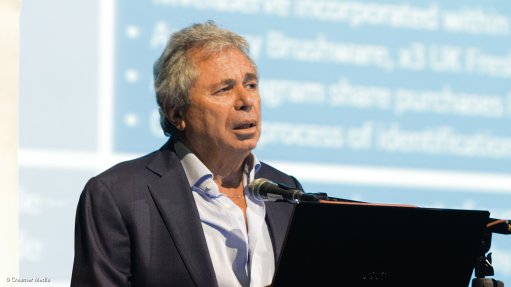
Bidvest CEO Brian Joffe
Notwithstanding “a backdrop of challenging market conditions, particularly in the Southern African region”, JSE-listed Bidvest’s headline earnings a share rose 13% to R10.02c, while basic earnings a share rose 7.8% to 930.9c for the six months to December 31.
Headline earnings rose 14.7% to R3.3-billion, with profit for the year up 9.5% to R3-billion.
Speaking at a presentation of the group’s results in Johannesburg on Monday, Bidvest founder and CEO Brian Joffe, who would step down as CEO when the Bidvest Foodservice business was unbundled, said trading results were solid, with the group’s turnover up 9.6% to R114.5-billion.
Bidvest Europe and Bidvest UK were major contributors to these increases, reflecting organic growth and assistance from currency effects.
Bidvest’s gross profit percentage increased off higher turnover to 20.5%, from 20.1% in 2014. The trading profit rose 11.6% to R5.2-billion. With the average rand exchange rate that weakened against the pound and the euro, this resulted in a 3.7% benefit to trading profit.
The group’s associate earnings fell 22.8%, impacted by a decline in the fortunes of aviation group Comair. This was offset to some extent by an improved performance at pharmaceuticals company Adcock Ingram.
While Adcock was valued at R52 a share, in line with group management’s June 2015 valuation, Bidvest group FD David Cleasby warned that further declines of the Adcock share price – following December – may result in noncash and non-headline earnings impairments at year-end.
BIDVEST FOODSERVICE
Joffe, meanwhile, highlighted the proposed unbundling and listing on the main board of the JSE of the Bidvest Foodservice business, which would be led by Bidvest Foodservice CE Bernard Berson. Joffe would become executive chairperson in the Foodservice business.
The remainder of the Bidvest group would be headed up by current Bidvest Industrial CE Lindsay Ralphs, while Joffe would continue his role as a director in South Africa. This would include an executive role to manage some of the strategic acquisitions.
Joffe noted that, in the food business, the focus of the wholesale segments remained on balancing the exposure between national and independent foodservice customers.
“Innovative technological foodservice solutions for customers as a value-add service continue to be rolled out. The fresh product offering presents significant potential in most regions. Across all our businesses, opportunities to add new product ranges and expand local footprints, through organic and acquisitive growth, will continue,” he said.
Bidvest Foodservice had secured real organic growth in local currencies in most businesses in an environment of near zero food inflation. The overall trading results in rands were buoyed by currency depreciation, said Berson.
Turnover rose 14.6% to R68.2-billion from R59.5-billion in 2014, with trading profit up 22.8%, at R2.4-billion. Bidvest Food Group achieved strong results in a challenging economic environment, with strong growth in the UK and Europe, while Australasia and emerging markets also provided a solid contribution.
SOUTH AFRICAN PERFORMANCE
Bidvest South Africa achieved 3.1% turnover growth to R45.3-billion and a 5.1% rise in trading profit to R2.7-billion.
It delivered an improved trading result, despite impacts from declining commodity volumes and prices at the freight business and weak consumer demand at Bidvest Automotive.
Good performances were achieved in the commercial, electrical and office and print divisions, according to the group. Bidvest Automotive, however, struggled in this period, with profitability down about 7%, which Ralphs suggested was a reflection of poor new-vehicle sales.
REDUCED PERFORMANCE
Further, trading profit fell at Bidvest Namibia as poor fishing and freight results outweighed the benefits of the division’s newly acquired automotive business.
Results disappointed with a flat turnover at R2.1-billion, while trading profit fell 30.1% to R120.7-million, from R172.5-million in 2014.
Freight and logistics performed below expectation and the group recorded a flat performance at the industrial and commercial divisions; however, the food and distribution divisions achieved some growth.
With Bidvest Namibia facing ongoing uncertainty around horse mackerel quotas, Joffe said initiatives and negotiations were under way to find more permanent solutions to the issue. He stressed the need for a mutual interest between the parties to set the quota at the right pricing to ensure competitiveness.
PROSPECTS
While trading conditions in South Africa were likely to remain subdued in a low-growth environment, Joffe noted that certain divisions had been realigned to cater for succession and to streamline the group’s service offering to customers.
To complement the group’s existing product and service offering, it aims to pursue local and international opportunities.
Joffe stressed that longevity was created when corporations were willing to change. In changing the business model, while retaining its principles, Bidvest had been able to regroup, re-energise, refocus and reposition itself to ensure its competitiveness, he stated.